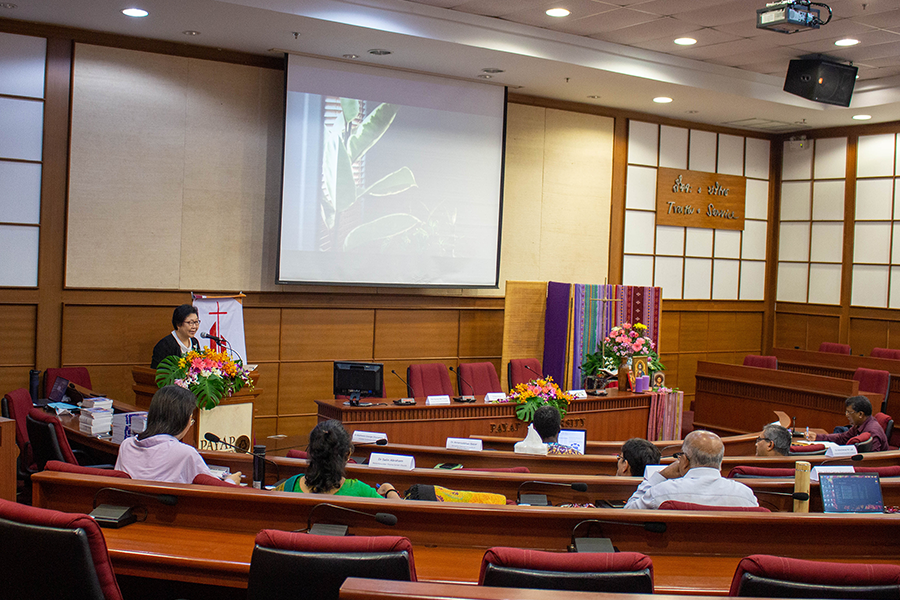Chiang Mai Declaration on Health, Healing, and Wholeness of Life issues clarion call for multi-pronged approaches to church health services and ministries
 Rev Kyung Hee Chang sharing aspects of spirituality and healing in hospice care
Rev Kyung Hee Chang sharing aspects of spirituality and healing in hospice care
Chiang Mai, Thailand: On the final day of the Christian Conference of Asia’s (CCA) international Conference on ‘Faith, Health, and Healing: Christian Response on Asia Today’, the participants adopted the Chiang Mai Declaration on Health, Healing, and Wholeness of Life in Asia.
The participants, hailing from medical, para-medical, and pastoral professions, as well as from different denominations and countries, collectively endorsed and adopted the landmark Declaration at the end of the three-day Conference.
The Declaration suggests twelve points of action for Asian churches and Christian health care institutions. Key points include eliminating financial barriers to health care for the poor, ensuring greater commitments to the development of human resources through church-supported medical and para-medical educational institutions, and ensuring governance, transparency, and accountability in the management of health ministries’ assets and finances.
The declaration also calls on churches and Christian health care institutions to provide accurate and reliable health information to congregations, combat misinformation, and empower local pastors with knowledge of health, thus allowing them to provide holistic care in partnership with health workers.
The Declaration asked churches and Christian health care institutions to recognise and adapt to changing paradigms caused due to the climate emergency, the post-pandemic context, emerging conflicts, and other mega-trends, and to ‘shape a world where everyone participates in the health and healing experience and no neighbourhood is left behind’.
Grounded in faith and theology, the Declaration affirmed the unique, relevant, and specific role of the Church that is ‘called to witness and participate creatively in the divine ministry of healing, restoring wholeness in broken human lives with compassion, being one with our Lord in His self-emptying and unconditional love’.
The final day of the CCA’s international Conference saw presentations on ‘Models of Churches’ Engagement in Health and Healing’.
Rev. Kyung Hee Chang from the Presbyterian Church in Korea (PCK) shared aspects of spirituality and healing in hospice care. She spoke of the necessity of alleviating pain and suffering through active listening, prayer, and counselling, and going beyond to care also for the family of the one who is suffering. Assessment of outcomes in hospice care is not to be done in terms of profit but must consider the quality of living and dying. Rev. Chang also shared her own testimony as a cancer survivor.
Dr Mwai Makoka and Dr Manoj Kurian from the World Council of Churches (WCC) spoke extensively on health campaigns in the ecumenical movement. After providing a brief history of the emergence of such projects in the ecumenical movement, the two executives of the WCC shared the work of churches in the health ministry in other parts of the world. They affirmed the necessity of collective advocacy through the ecumenical movement, which served as a platform for sharing and a network of support.
“Medical institutions and churches on national, and more particularly local levels, have travelled too often in separate directions. This lack of collaboration is not new but existed even fifty years ago,” shared Dr Mwai Makoka from Malawi, who has also produced three WCC volumes on ‘Health-Promoting Churches’.
Dr Makoka further shared promotive approaches that required community involvement and community-based activities, and contributed to disease eradication, in contrast to curative approaches that responded to perceived needs and created a willingness to pay.
Churches, rooted in communities, were better positioned to do promotive activities for health. Such interventions, however, were meaningful only if sustained over a set period, rather than mere day-long camps or drives that superficially engaged with health.
Dr Kurian, who heads the WCC’s Ecumenical Advocacy Alliance (EAA), put forth a multi-pronged approach to health and emphasised the necessity of churches’ intersectional action on the challenges of food scarcity, the climate emergency, HIV and AIDS, economic inequalities, and other systemic issues that maintain states of ill-health and disease.
Using the parable of the Good Samaritan, the WCC executives explained that although churches and church health care institutions preferred to view themselves as the good Samaritan, the actual role they played was that of the innkeeper—who was paid to provide the services, who did not inflate bills because the benefactor could pay, and who was reliable, professional, and trust-worthy.
Lively discussions on the need for creative enhancement of churches’ capacities to respond to health issues ensued, with a recognition of their oft-scarce and limited resources. The participants affirmed that churches were to ‘start where they were’ with the resources that they had, and be reinvigorated in their calling to serve ‘the least, the last, and the lost’.
The three-day international Conference organised by the Christian Conference of Asia was a platform that brought together about 30 experts from 27 different organisations to discern the direction of Asian churches’ health and healing services and ministries.
The Consultation was held at the Payap University Campus, Chiang Mai, from 10–12 October 2022.










